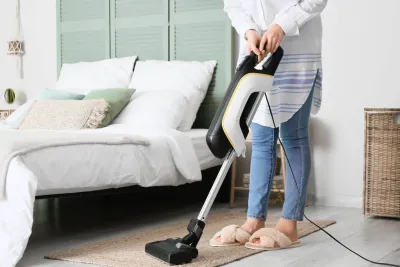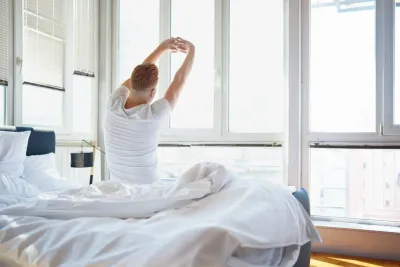Achieving Better Sleep: Basic Cleaning Tips for Your Bedroom
Chilipad Editorial Team • Apr 23, 2025

Key Takeaways
A cleaner bedroom does more than look good—it helps your brain power down.
- A tidy, clutter-free room signals relaxation, making it easier to unwind and fall asleep.
- Washing sheets and pillowcases regularly reduces dust mites, allergens, and sweat buildup that can disrupt sleep.
- Vacuuming floors, especially under the bed, and wiping down surfaces removes hidden irritants that affect sleep quality.
- Clean windows and curtains improve airflow and light control, supporting healthier circadian rhythms.
- Calming scents like lavender can reinforce bedtime cues and help your brain shift into sleep mode.
As everyone knows, spring is all about renewal. As the cold of winter wanes and the sun begins to warm our bones, many people move into spring cleaning mode.
This practice can take many forms, from a furious session of purging items from your home to committing to a new daily practice like meditation or making dramatic changes to your diet.
The philosophy of “out with the old and in with the new” is a powerful one, and following it can definitely improve your sleep. During the winter, people tend to live in more of a cocoon, eating larger meals and staying inside to cope with the cold.
Whether these shifts are large or small, they have the potential to impact your sleep patterns—and, in severe cases, disrupt circadian rhythms.
Positioned after the spring equinox, let Sleep Awareness Week and World Sleep Day serve as reminders for you to take inventory of your sleep habits and environment.
That way, you can remove what’s not working as the daylight hours grow longer and add habits or make changes to your bedroom that have the potential to improve your sleep if you’re not resting consistently. Or, you can enhance your sleep recipe and/or the environment if you’re already sleeping soundly.
A clean bedroom isn’t just about aesthetics — it’s about sleep hygiene, allergens, airflow, and mental calm that help your brain and body wind down. In this guide, we break down practical cleaning tips to make your sleep space rest-ready and your sleep quality better — year-round.
Here are just a few tips you can follow to get started.
Combine a Clean Bedroom with a Chilipad for Optimal Sleep
An organized bedroom can significantly improve your sleep quality. For an added boost, consider a Chilipad bed cooling system to perfectly regulate your sleeping temperature. Combining both can create the ultimate sleep environment.
What Does “Cleaning for Better Sleep” Really Mean?
Cleaning up your sleep space can be as simple as pulling out the vacuum and the dust cloth, and it should not just happen once a year in the spring!
Microscopic house dust mites can wreak havoc with your allergies and, consequently, your sleep! [1] Here are a few general cleaning tips for your bedroom to prepare for a good night's sleep.
Below, find suggestions for spring cleaning tips designed to help you tackle each area effectively.
- Wash window screens and windows in the bedroom
- If possible, clean your mattress
- Vacuum the carpet and/or area rugs
- Remove carpet odors with baking soda
- Wash pillows routinely with warm water and replace them as needed
- Regularly wash your sheets and replace worn-out sheets
- Clean baseboards with a damp microfiber cloth to remove dust
- Clean a cluttered bedroom space
Creating a daily cleaning schedule for your bedroom with the right cleaning tools can help you stay on top of it and continually have a clean bedroom that can promote good sleep hygiene.
Spring Cleaning Tip: Remember, having a spring cleaning checklist can be a handy reminder of the annual cleaning tasks you need to tackle.
Why Washing Your Bedding Helps You Sleep Better
This is one of the best ways to guarantee a good night's sleep. Clean sheets, pillowcases, and blankets not only feel great against your skin but also help to reduce allergens and irritants that can disturb your sleep.
Dust, pet dander, and other particles can accumulate in your bedding over time, triggering allergies and causing discomfort. By regularly washing your bedding at least once a week, you can keep it clean and fresh and enjoy a more peaceful and restful night's sleep.
Plus, during allergy season, using hypoallergenic detergent and avoiding fabric softeners can help reduce the risk of skin irritation and allergy symptoms. Making these habits can result in a healthier and more comfortable sleep environment.
Did You Know: It's recommends washing bed sheets at least every two weeks. People with allergies, pets, and/or sensitive skin should do so more frequently. Mattress pads/protectors, pillow protector(s), and/or blankets should be washed at least seasonally.
Regularly washing your sheets may enhance the quality of your sleep. A survey has found that people who are "very satisfied" with their sleep tend to wash or change their sheets every 12.8 days on average. On the other hand, those who are "very unsatisfied" with their sleep tend to go an average of 19.9 days between washings. [2]
How Decluttering Reduces Stress and Improves Sleep
Maintaining a clutter-free bedroom can help create a peaceful and calming sleep environment. An orderly room free of unnecessary items and disorders can significantly impact your mental health, reducing stress and anxiety levels, which are crucial for obtaining quality sleep.
To some, this can be an overwhelming task. If that's the case, start by organizing and neatly storing personal items, making sure everything has its place.
Regularly clearing out anything that doesn't contribute to a restful atmosphere, such as work-related materials, excessive decorative items, or electronic devices, can also help.
Consider adopting minimalistic decor and functional storage solutions to keep surfaces clear and the room feeling more open and tranquil. This organization not only makes your space more visually appealing but also psychologically comforting, making it easier to unwind, relax, and drift into a restorative sleep.
The more clutter piles up, the heavier the guilt weighs for not tackling it.
Study: In a study, individuals who regularly made their beds almost every day were more likely to say they had good sleep compared with those who did so less often. [3]
Why Cleaning Under the Bed Matters
Removing dust and clutter from under the bed can improve air quality in the room and create a more serene sleeping environment. Did you know that dust and clutter under the bed can affect the air quality in your room?
Not only can it cause allergies and respiratory problems, but it can also disrupt your sleep.
Improving the air quality in your room can be as simple as taking time to remove dust and clutter, but this task is often overlooked. Additionally, keeping the area under your bed clean can prevent the accumulation of dust mites, which can cause asthma and other respiratory problems.
How Clean Windows and Curtains Improve Air & Light
Keeping your bedroom fresh and clean includes remembering to wash your windows - a task that is often overlooked.
Regularly cleaning curtains or blinds helps eliminate accumulated dust, dirt, and odors, contributing to a healthier environment.
Remember to also pay attention to your walls, window panes, and frames with a microfiber cloth or damp sponge to remove smudges, fingerprints, and grime. These simple steps can make a big difference in creating a more comfortable, clean bedroom.
Boost Your Sleep with a Technology-Free Bedroom
To help you sleep better, transform your bedroom into a technology-free area by removing items like TVs, phone chargers, and computers, and avoid using the space as an office. These everyday devices give off blue light, which can disrupt your sleep cycle and make it harder to wind down.
This step involves designating your sleep space solely for sleeping purposes. By doing so, you can minimize the temptation to expose yourself to blue light before bedtime and reduce the possibility of sleep disturbances caused by flashing LED lights and notification sounds.
Although it may seem extreme, sleep experts recommend trying this approach to remove blue light for a month to determine whether it improves sleep quality.
Incorporate Indoor Plants
Consider adding indoor plants, such as snake plants, to your bedroom. They can provide numerous benefits. Not only do they help improve air quality by absorbing pollutants and releasing oxygen, but they also add a sense of calm and beauty to the room. [4]
Indoor plants have been shown to reduce stress levels, increase productivity, and promote overall well-being. So, whether you want to brighten your bedroom or create a more peaceful atmosphere, adding indoor plants is worth considering.

Other Ways to Improve Your Sleep This Spring
Besides a thorough spring cleaning of the bedroom, here are some other effective ways to enhance your sleep this spring:
Enjoy the Outdoors
A lack of sunlight exposure definitely affects your sleep. Getting sunlight is important because it’s your main source of Vitamin D, which is critical for maintaining serotonin levels for a healthy sleep-wake cycle.
The suprachiasmatic nuclei (SCN) is the central master clock in humans. Light from the environment enters your eyes and helps the SCN reset for the next sleep-wake cycle. Morning sunlight can help improve sleep quality [5], making it even more important to get outside.
Now that spring is here, you don’t have any excuses! Running your toes through the green grass and taking a deep breath can help you ground yourself for your upcoming day and provide essential sleep benefits. [6]
Did You Know: Performing exercise can help you sleep better?
Get Some Fresh Air
As the weather continues to get warmer, it's time to open your bedroom windows. Nothing helps you breathe and slee better than nice, cool, fresh air. In a recent study, improved ventilation and airflow have been related to better sleep. [7]
Bedrooms often have high moisture levels in the air. This can make the room feel warm and clammy, disrupting sleep.
By having the windows and doors open, the humid air from the inside has a chance to exit through the windows and allow the dryer air back in the house. Doing so can help create a less humid environment in your bedroom.
Take Steps to Reset Your Sleep Habits
When assessing your sleep habits, it's important to consider your chronotype and lifestyle. Understanding how your chronotype affects your sleep is a crucial first step towards improving it.
While sleep apps and technologies can help you track your sleep, they can be daunting for the uninitiated. Furthermore, they aren’t necessary for a reset. Simply start by going to bed and waking up at the same time.
Creating a stricter sleep schedule is the single most important step you can take. Once you’re on track, you can remove some habits (like using technology before bed) or add new ones (like meditation).
Final Thought
When it comes to sleep, your bedroom environment matters—a lot. A clutter-free, freshly cleaned space isn’t just nice to look at; it sets the stage for a truly restful environment and sleep. From regularly washing your sheets to dusting under the bed, these simple habits help eliminate allergens and irritants that can mess with your rest.
Don’t forget the often-overlooked details, like wiping down windows and cleaning curtains, which can boost air quality and freshen up the vibe. Want to go the extra mile? Add in calming scents like lavender or eucalyptus to create a spa-like sleep sanctuary.
Bottom line: spring cleaning isn’t just about tidiness—it’s about transforming your bedroom into a space that invites deep, uninterrupted sleep. A cleaner space leads to a clearer mind, and a clearer mind leads to better nights. Sleep well.
Spring Cleaning Frequently Asked Questions
Does a Messy Bedroom Really Disrupt Sleep?
Absolutely—your brain notices the chaos, even if you think you’ve tuned it out. Clutter can create a sense of unfinished business, triggering low-level stress that makes it harder for your mind to wind down. Physically, a messy space might trap dust and allergens, interfering with air quality and overall restfulness. Clean space, clean sleep. Simple as that.
What Is the Link Between Cleanliness and Sleep Quality?
A cleaner bedroom reduces allergens, stress, and distractions, making it easier for your brain to wind down and your body to rest.
What Are Some Quick Ways to Make My Bedroom More Sleep-Friendly?
- Declutter nightstands and dressers
- Vacuum or sweep floors regularly
- Use blackout curtains to block light
- Wash bedding and pillowcases weekly
- Add calming scents like lavender or eucalyptus
- Keep electronics and cords tidy or out of sight
Peer-Reviewed Research References
-
National Sleep Foundation.
Bedroom Poll 2011: Summary of Findings.
National Sleep Foundation, 2011.
Study Type: National Sleep Survey
Key Finding: The survey found that bedroom environment factors—including noise, light, temperature, and the presence of electronics—play a significant role in sleep quality and nighttime disturbances among adults.
View Resource
Source URL: https://www.thensf.org/wp-content/uploads/2021/03/2011-NSF_Bedroom_Poll_Report.pdf
-
Riley, M.
America Undercover: What Do Americans Put in Their Beds?
Sleep Junkie, January 20, 2020.
Study Type: Consumer Research & Survey Analysis
Key Finding: The report highlights the wide range of items Americans keep in their beds—including electronics, pets, and personal objects—which may contribute to sleep disruptions, hygiene concerns, and reduced sleep quality.
View Resource
Source URL: https://www.sleepjunkie.com/america-undercover/
-
National Sleep Foundation.
Bedroom Poll 2011: Summary of Findings.
National Sleep Foundation, 2011.
Study Type: National Sleep Survey
Key Finding: Findings reinforce that environmental and behavioral habits within the bedroom strongly influence sleep duration and quality, underscoring the importance of a sleep-optimized bedroom setup.
View Resource
Source URL: https://www.thensf.org/wp-content/uploads/2021/03/2011-NSF_Bedroom_Poll_Report.pdf
-
Lee, M. S., Lee, J., Park, B. J., & Miyazaki, Y.
Interaction with Indoor Plants May Reduce Psychological and Physiological Stress by Suppressing Autonomic Nervous System Activity in Young Adults.
Journal of Physiological Anthropology, 2015.
Study Type: Randomized Crossover Study
Key Finding: Interaction with indoor plants significantly reduced stress markers and autonomic nervous system activity, suggesting that biophilic elements may promote relaxation and support better sleep readiness.
View Study
Source URL: https://pmc.ncbi.nlm.nih.gov/articles/PMC4419447/
-
Chevalier, G., Sinatra, S., Oschman, J., Sokal, K., & Sokal, P.
Earthing: Health Implications of Reconnecting the Human Body to the Earth’s Surface Electrons.
Journal of Environmental and Public Health, 2012.
Study Type: Review Article
Key Finding: Grounding or “earthing” may influence physiological processes such as inflammation, cortisol rhythms, and sleep, though further research is needed to clarify mechanisms and long-term effects.
View Study
Source URL: https://doi.org/10.1155/2012/291541
-
Mishra, A. K., van Ruitenbeek, A. M., Loomans, M. G. L. C., & Kort, H. S. M.
Window/Door Opening-Mediated Bedroom Ventilation and Its Impact on Sleep Quality of Healthy, Young Adults.
Indoor Air, 2017.
Study Type: Experimental Field Study
Key Finding: Improved bedroom ventilation through window or door opening was associated with better sleep quality and perceived freshness of the sleeping environment in healthy young adults.
View Study
Source URL: https://doi.org/10.1111/ina.12435
-
National Sleep Foundation.
Sleep in America® Poll Report: Americans Can Do More During the Day to Help Their Sleep at Night.
National Sleep Foundation, 2022.
Study Type: National Sleep Survey
Key Finding: The poll found that daytime behaviors—such as physical activity, stress management, and light exposure—play a critical role in nighttime sleep quality and overall sleep health.
View Resource
Source URL: https://www.thensf.org/wp-content/uploads/2022/03/NSF-2022-Sleep-in-America-Poll-Report.pdf









